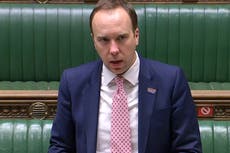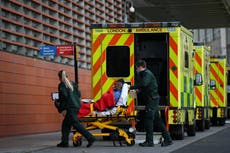Police warn that New Year’s Eve parties ‘should not be happening’ as restrictions tightened for millions
Indoor household mixing illegal for all of England apart from Isles of Scilly under laws coming into force at midnight
Large New Year’s Eve parties “should not be happening,” police have said as the government tightens coronavirus restrictions across England.
Around 44 million people, 78 per cent of England’s population, will be under the highest tier 4 rules from midnight after ministers announced an escalation of measures in response to surging infections. Only the Isles of Scilly will be in the least severe category.
For the vast majority of the population, indoor mixing between people from different households will be illegal and the organisers of gatherings of more than 30 people can be punished with £10,000 fines.
While major firework displays and outdoor celebrations have been cancelled, several groups have announced their intention to hold protests on Thursday evening.
Conspiracy theorist Piers Corbyn, the brother of former Labour leader Jeremy Corbyn, has called for people to hold “street parties” across the UK on New Year’s Eve.
Protests are not an exemption to restrictions on gatherings in tier 4 areas and are legal only if certain conditions are met under lower restrictions.
Martin Hewitt, chair of the National Police Chiefs’ Council, said he was confident that the majority of people would respect the rules for their area.
“Restrictions on social gatherings and certain businesses remain in place across all tiers. Large gatherings and parties should not be happening,” he added. “We ask anyone thinking of attending or organising one not to do so.
“We understand that this year has been incredibly difficult for everyone, and while many want to celebrate, the rules to prevent the spread of coronavirus are there to protect us all. It is vital that everyone understands the restrictions in their area in the run-up to the new year and beyond.”
Police have been instructed to continue using the same approach used throughout the pandemic of engaging with people, explaining the law and encouraging them to follow it voluntarily before moving to enforcement.
But Mr Hewitt warned: “Those who blatantly ignore the regulations should expect to receive a fixed penalty notice and we’ll target our resources towards those who commit the most serious breaches and put others at risk through their behaviour.”
New Year’s Eve is normally one of the busiest nights for policing and any calls over potential breaches will be assessed against competing demands and the scale of the health risk.
The Police Federation, which represents rank-and-file officers, said the demand on policing was “as great as ever”.
“My colleagues are working around the clock to protect the public from this deadly virus on top of responding to non-Covid related 999 calls,” chair John Apter added.
“We would urge the public to continue to act responsibly and follow the rules. For many of us, this will mean celebrating the New Year in a different way. Making a small sacrifice will help reduce the impact on our overwhelmed emergency services and keep each other as safe as possible.”
In London, the Metropolitan Police said it had drawn up a “dedicated policing plan” for the evening.
Officers will be deployed across the capital to focus on people “intent on breaching” restrictions, especially in parts of London with the highest infection rates.
“I would urge everyone to exercise caution, listen to government advice and celebrate the new year in the comfort of their own homes, not the homes of family and friends,” said commander Paul Brogden, who is leading the operation.
“If people insist on gathering and breaching regulations, then officers will attend and encourage people to disperse. Where necessary, enforcement action, including fines starting at £100 and working their way up to £10,000, will be considered.”
Greater Manchester Police said its officers “do not want to be spoiling anyone’s celebrations” and urged people to remain within the law.
Assistant chief constable Nick Bailey said: “We have additional resources in place that will be ready to respond to any blatant breaches, and are proactively continuing to gather intelligence in the run up to the new year in order to help prevent any unlawful gatherings from taking place.”
In tier 4 areas, indoor household mixing is illegal and people can only meet one other person outdoors in a public space.
All restaurants, bars and pubs must close and people cannot stay away from home unless in a linked household.
A further 12 million people, around a fifth of England’s population, will be in tier 3 from New Year’s Eve.
This level of restrictions also bans indoor household mixing, and outdoor gatherings are limited to a maximum of six people.
Hospitality venues, such as pubs and restaurants, must close apart from takeaway services.
No areas of England will be in tier 2, and just 2,000 people remain in tier 1 on the Isles of Scilly, where groups of up to six people are allowed to meet inside and hospitality businesses can stay open.
Announcing the changes on Wednesday, Matt Hancock said soaring coronavirus cases meant it was “absolutely necessary” to increase restrictions.
“I know that tier 3 and 4 measures place a significant burden on people, and especially on businesses affected, but I am afraid it is absolutely necessary because of the number of cases that we've seen,” the health secretary added.
Mr Hancock said the newly approved Oxford/AstraZeneca vaccine, due to be rolled out from Monday, would help bring an end to the restrictions.
The government said a further 981 people have died within 28 days of testing positive for Covid-19 as of Wednesday, bringing the UK total to 72,548, and more than 50,000 new infections had been confirmed in a day.
It was the highest daily deaths figure reported since 1,010 on 24 April, although Wednesday’s numbers are thought to contain deaths and cases which were not reported over the Christmas period.
Separate figures published by the UK's statistics agencies for cases where Covid-19 has been mentioned on the death certificate, together with additional data on deaths that have occurred in recent days, suggest there have been 88,000 deaths involving coronavirus since the beginning of the pandemic.
Join our commenting forum
Join thought-provoking conversations, follow other Independent readers and see their replies
Comments




Bookmark popover
Removed from bookmarks